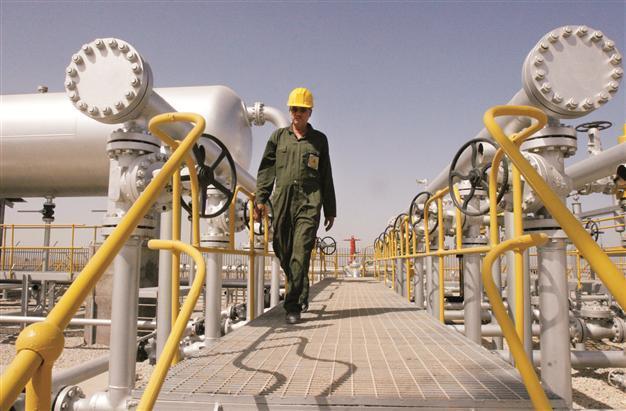Iran vows battle against fresh oil sanction by EU
TEHRAN

An Iranian oil technician makes his way to the oil separator facilities in the Azadegan oil field southwest of Tehran, Iran. New EU sanctions on Iran took effect yesterday. AP photo
Iran has stored up imports and hard currency for a “battle” against “dastardly” EU sanctions, officials said yesterday, the day that the measures aimed at pressuring the Islamic Republic over its controversial nuclear program took effect.
Vice President Mohammad Reza Rahimi said the country has stockpiled toward meeting the population’s daily needs, to reduce the impact of the embargo hitting the oil and banking sectors.
“Today, we are facing the heaviest of sanctions and we ask people to help officials in this battle,” Rahimi was quoted by the website of Iranian state television as saying at a religious conference. He said the “dastardly sanctions” might cause “occasional confusion” in the market, but that the Iranian nation would not be stopped.
Central Bank governor Mahmoud Bahmani also told the semiofficial Mehr news agency that Iran has “plans” to deal with the embargo and enough hard currency to meet its import needs.
The EU said earlier this week that all contracts for importing Iranian oil will have to be terminated from yesterday. Also, European companies will no longer be involved in insuring Iranian oil.
The measures come on top of previous sanctions levied by the U.S. and the West that have already hit Iran’s economy. U.S. officials say the American sanctions have cut exports of Iranian crude from about 2.5 million barrels a day last year to between 1.2 and 1.8 million barrels now.
‘Not passive in face of sanctions’
“We have not remained passive. To confront the sanctions, we have plans in progress,” said Bahmani. He did not elaborate on the plans.
On June 29 Bahmani said Iran is “easily” selling its oil despite all current and future sanctions because some countries have received waivers from the U.S. to import some Iranian oil despite the punitive measures.
The U.S. State Department has announced that China, India, Japan, Malaysia, South Korea, Singapore, South Africa, Sri Lanka, Turkey and Taiwan have been given waivers from the U.S. in exchange for “significantly reducing” oil imports.
Iran’s Oil Minister Rostam Ghasemi meanwhile ordered his staff to “mobilize” against “illegal sanctions,” Mehr said. It did not say what the measures were.
Late on June 29 Ghasemi told state television that Iran has weathered previous rounds of sanctions. “I do not see it as a problem that enemies have imposed an embargo today,” he said. “Simply, because they have imposed similar sanctions years ago, and nothing happened.”
He said Iran has already stopped selling oil to many EU countries and sold to others instead. “Developing countries and countries with fast economic growth have no alternative to oil. Fortunately, because of the quality of our country’s oil, all are interest in using it.”
The International Energy Agency (IEA) says Iran crude exports in May appear to have slipped to 1.5 million barrels per day (mbpd) as the market braced for the embargo, which has been phased in since being announced January 23. That is far less than the 2.1-2.2 mbpd Iran insists it continues to sell abroad.
Just one day before the start of the embargo, Iran called for Organization of Petroleum Exporting Countries (OPEC) to hold an extraordinary meeting to rein in output going over its agreed total quota because oil prices have dipped to a “critical level” under $100 a barrel.
“We have asked the secretary general to set up an extraordinary meeting as prices have become irrational,” Qasemi was quoted as saying on his ministry’s official news website Shana.
The price of Brent crude, a reference point for the market, has slipped from a four-year high of $128 a barrel in early March to less than $100 a barrel. On June 28, Brent North Sea oil for August delivery was selling for $97.80 a barrel -- a big jump over previous days’ trading but still under the $100-a-barrel target set by OPEC.
Compiled from AFP, AP and Reuters stories by the Daily News staff in Istanbul.
